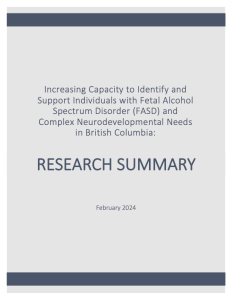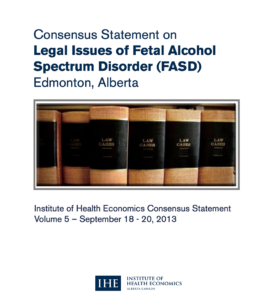Research Summary: Increasing capacity to identify individuals with FASD in BC – The knowledge gathering activities summarized in this report were conducted as part of a larger project entitled, “Increasing capacity to identify and support individuals with Fetal Alcohol Spectrum Disorder (FASD) and complex neurodevelopmental needs in British Columbia (BC).” The overall aim of the larger project is to improve services and supports for individuals with FASD who are involved in the criminal legal system in BC, to ultimately improve their trajectories and outcomes.
Risk, rights and deservedness: Navigating the tensions of Gladue, Fetal Alcohol Spectrum Disorder and settler colonialism in Canadian courts – In 2008, the Truth and Reconciliation Commission of Canada engaged in a public project of national reconciliation to address the ongoing impacts of settler colonialism including the disproportionate number of Indigenous adults and youth who are held in remand facilities awaiting trial or sentence as well as those who are convicted and sentenced to periods of incarceration. Efforts to further reconciliation by reducing Indigenous incarceration rates have relied largely on the courts and their application of a sentencing principle rooted in the Supreme Court’s ruling in R. v. Gladue [1999] 1 SCR 688. In this article, we argue that the Gladue sentencing principle is being fundamentally undermined in the courts through risk models that actively displace the very context that Gladue reports seek to illuminate. Included in the analysis are the compounding impacts facing Indigenous individuals struggling with a complex disability like Fetal Alcohol Spectrum Disorder.
Consensus Statement on Legal Issues of Fetal Alcohol Spectrum Disorder (FASD) – This consensus statement on Legal Issues of Fetal Alcohol Spectrum Disorder is the product of a unique IHE Consensus Development Conference held in September 2013. The event was a three-day juried hearing of evidence and scientific findings that allowed for the engagement and collaboration of citizens and decision makers in government and the justice system in addressing a specific set of key questions on legal issues related to FASD.
Fetal Alcohol Spectrum Disorder and the criminal justice system: A systematic literature review – The objective of this article was to provide a systematic global over- view of the available evidence relevant to individuals with FASD or PAE who are involved in the criminal justice system. A further aim was to support discussion of ways in which moving forward can incorporate an evidence-based foundation and to demonstrate how evidence in this area might help direct effective programming to best support indi- viduals with FASD, with impacts extending across sectors.
Fetal alcohol spectrum disorder and youth justice: a prevalence study among young people sentenced to detention in Western Australia – The objective of this study is to estimate the prevalence of fetal alcohol spectrum disorder (FASD) among young people in youth detention in Australia. Neurodevelopmental impairments due to FASD can predispose young people to engagement with the law. Canadian studies identi ed FASD in 11%– 23% of young people in corrective services, but there are no data for Australia.
Fetal Alcohol Spectrum Disorders in the Criminal Justice System: A Review
The lived experience of paroled offenders with fetal alcohol spectrum disorder and comorbid psychiatric disorder — This case study presents the life history and postincarceration experiences of two forensic psychiatric patients diagnosed with comorbid mental illness and fetal alcohol spectrum disorder (FASD).
Environmental Scan: FASD & The Justice System in Canada — This environmental scan examines FASD and justice programs across Canada with attention to both youth and adult programs. It is a working document that aims to engage with the youth and adult justice sectors to facilitate understandings of programs and practices, and is the first step in formulating a comprehensive summary of FASD and the justice system across Canada. This scan outlines external and internal factors when considering FASD and from that highlights areas of strength and weakness when thinking about FASD programming in the justice system.
FASD and the Criminal Justice System ( English | français ) — Individuals with FASD frequently come into contact with many areas of the justice system: as victims of crime, as witnesses, as individuals in conflict with the law, and in family and civil law matters. There is a need for enhanced understanding of the concerns of people living with FASD in all of these areas of the justice system.
Issue Papers
Gap Analysis: Human Trafficking and Fetal Alcohol Spectrum Disorder — The purpose of this gap analysis is to describe what is known about human trafficking and FASD, identify complexities unique to FASD that can increase vulnerability to trafficking, and to provide research, policy, and practice recommendations.
FASD and the Criminal Justice System: A Review — Involvement in the criminal justice system (CJS) has long been identified as a significant adverse outcome for many individuals with FASD. The legal issues associated with FASD have substantial financial implications, with estimates of annual justice-related costs at $1.2 billion per year in Canada, functioning as one of the greatest cost drivers linked with FASD. Although there is growing interest in how to shape judicial responses, treatment, and policy to better address the needs of this population, the extent to which interventions and reforms are grounded in empirical evidence is unclear. Uninformed changes could not only prove to be ineffective but may even lead to unanticipated negative outcomes. The purpose of this issue paper is to provide a summary of the current state of the evidence on FASD in the CJS.
Victimization in People with FASD — Fetal Alcohol Spectrum Disorder (FASD) is disability that affects the body and brain, causing life- long impacts on physical and cognitive development, social and emotional functioning, and behaviour.1 Individuals with FASD are also at increased risk for negative life outcomes, including trouble with school and work, mental health and substance use issues, inappropriate behaviours, as well as involvement with the legal system. In the context of criminal justice, most researchers mention the increased risk of individuals with FASD coming into contact with the system as offenders, witnesses, and/or victims,3 however, very little attention is paid to the complexities of the victimization of those with FASD. Thus, the goal of the current paper is to explore the issue of victimization in FASD and make recommendations for improving the justice process for these individuals.


